

How to get started with big data in your hotel. The whole conversation around big data is exhausting.
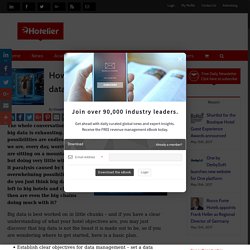
The possibilities are endless. But here we are, every day, worried that we are sitting on a mountain of data but doing very little with it. But is it paralysis caused by these overwhelming possibilities? Or do you just think big data is best left to big hotels and chains? But then are even the big chains doing much with it? Big data is best worked on in little chunks – and if you have a clear understanding of what your hotel objectives are, you may just discover that big data is not the beast it is made out to be, so if you are wondering where to get started, here is a basic plan. Establish clear objectives for data management – set a data management strategy.Ensure that you have clear answers to.Why is it important to our hotel/s? Where is your guest data and where is it being captured? Traditionally, guest data typically covered name, contact details and high-level demographic information. Will Smart Hotels be Autonomous or Connected?
By 2030, multiple changes will occur and will influence the hospitality industry due to globalization, one of them being a shift of market power.
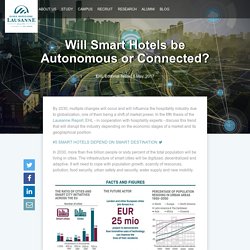
In the fifth thesis of the Lausanne Report, EHL - in cooperation with hospitality experts - discuss this trend that will disrupt the industry depending on the economic stages of a market and its geographical position. In 2030, more than five billion people or sixty percent of the total population will be living in cities. The infrastructure of smart cities will be digitized, decentralized and adaptive. It will need to cope with population growth, scarcity of resources, pollution, food security, urban safety and security, water supply and new mobility. Download the fifth thesis of the Lausanne Report now!
Environmental issues, the scarcity of resources, and the management of emergencies can be strong incentives for hotels to become autonomous and therefore reach a competitive advantage over peers. Here are some key rationales of Autonomous Hotels: Organic Hotel Booking - Always Travel with your Heart. How to get started with big data in your hotel. 5 Hotel Brands With Useful Mobile Apps. Have you checked into a hotel without speaking to a single person yet?

Maybe order room service and book a massage at the spa without dialing a single number? If not, you will soon enough. With mobile becoming more and more important for all brands, it’s not surprising that the hospitality industry is taking advantage of mobile technology. Beyond just booking stays, some hotel brands’ apps are taking things up a notch and offering more mobile features, like full concierge services and all kinds of local information and deals. “Today’s guests expect to be able to use their smartphones to do almost everything,” said George Corbin, senior vice president of digital, Marriott International. Check out these five hotel chains with useful mobile apps. Marriott HotelsMarriott Hotels app lets users check in to their hotel anytime after 4 pm the day before their arrival and can pick up their pre-programmed key-card at special expedited mobile check-in desks.
Image via Shutterstock. What Is the Difference Between Efficiency and Effectiveness in Business? SAGE Journals: Your gateway to world-class journal research. Developing a people-technology hybrids model to unleash innovation and creativity: The new hospitality frontier. Abstract The purpose of this study is to propose a theoretical framework to harness creativity and innovation through people and technology.
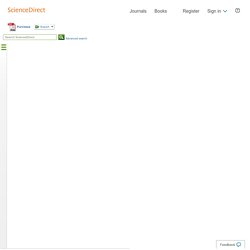
This study is grounded based on an extensive synthesis of previous scientific research and industry practices. It undertakes a detailed review of the literature to derive a framework and detail research and practical guidelines for both scholars and practitioners in the hospitality discipline. Advancements in computer and communications technologies is creating many unanticipated changes in how employees and customers interact, how service work is done, and how hospitality businesses succeed. This study investigates such changes.
Keywords People; Technology; Innovation; Creativity; Co-creation; Service culture; Service climate; Hybrid organization Choose an option to locate/access this article: A model that connects information technology and hotel performance. Highlights We review global proposals about IT influence on hotel organizational performance.
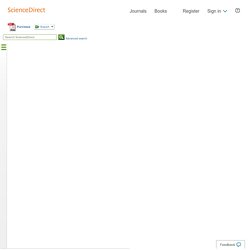
We review particular IT paths toward different hotel organizational performance facets. We present a comprehensive model that details the routes that IT applications follow in order to improve hotel performance. Abstract Despite vast investments in IT, there is scant research and empirical data that connects, in depth, IT with firm performance in the hospitality industry. Keywords Information technology; Hotels; Organizational performance; Productivity; Customer service; Commercialization Choose an option to locate/access this article: Check if you have access through your login credentials or your institution Check access. Tourism Innovation: Theoretical and Empirical Review. SAGE Journals: Your gateway to world-class journal research. SAGE Journals: Your gateway to world-class journal research.
Strategic use of information technologies in the tourism industry - ScienceDirect. <div pearltreesdevid="PTD265" role="alert" class="alert-message-container"><div pearltreesdevid="PTD266" aria-hidden="true" class="alert-message-body"><span pearltreesdevid="PTD267" style="display: inline-block;" class="Icon IconAlert"><svg pearltreesDevId="PTD268" style="width: 100%; height: 100%;" width="24" height="24" focusable="false" tabindex="-1" fill="currentColor"><path pearltreesDevId="PTD269" fill="#f80" d="M11.84 4.63c-.77.05-1.42.6-1.74 1.27-1.95 3.38-3.9 6.75-5.85 10.13-.48.83-.24 1.99.53 2.56.7.6 1.66.36 2.5.41 3.63 0 7.27.01 10.9-.01 1.13-.07 2.04-1.28 1.76-2.39-.1-.58-.56-1.02-.81-1.55-1.85-3.21-3.69-6.43-5.55-9.64-.42-.52-1.06-.83-1.74-.79z"></path><path pearltreesDevId="PTD270" d="M11 8h2v5h-2zM11 14h2v2h-2z"></path></svg></span><!
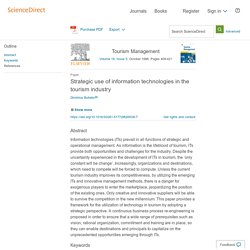
-- react-text: 57 -->JavaScript is disabled on your browser. Please enable JavaScript to use all the features on this page. <! -- /react-text --></div></div> Abstract Keywords Information technology tourism industry distribution channels. Docs - create and edit documents online, for free. Docs - create and edit documents online, for free.